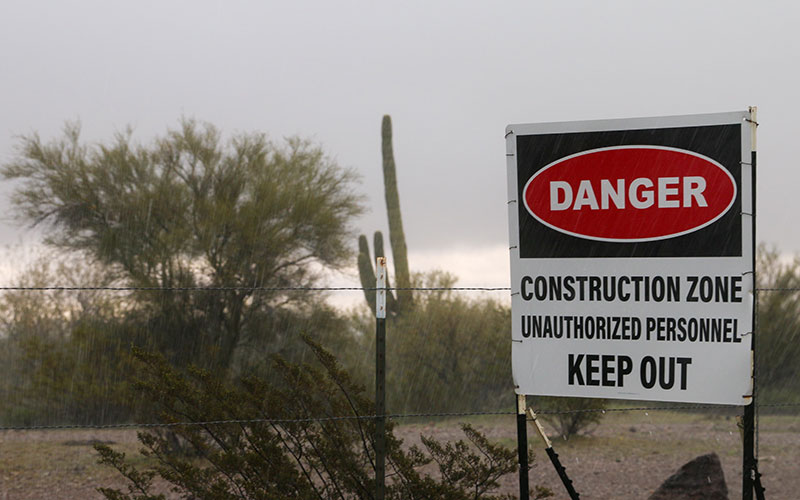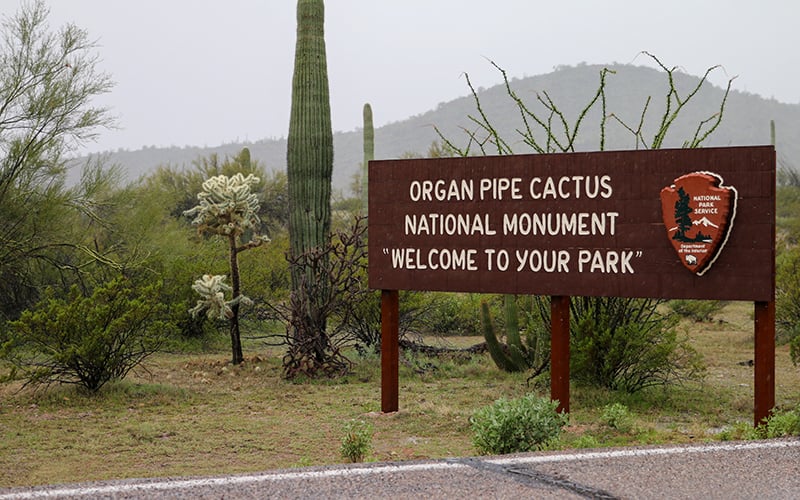WASHINGTON – Tohono O’odham and congressional officials are condemning the “utterly shameful” use of tear gas and rubber bullets to disperse a small group of people during a peaceful border wall protest Monday near Ajo.
The incident began as Arizona Department of Public Safety troopers were responding to reports that a couple dozen people had blocked State Route 85 at milepost 57, “creating a significant traffic back-up.”
When the protesters refused orders to move, troopers deployed smoke and tear gas to clear the highway, then fired rubber bullets at two protesters who tried to throw the canisters back at officers, the department said.
“The use of tear gas on O’odham and fellow American citizens exercising their sacred constitutional right to protest is utterly appalling, and not something that should be tolerated in our democracy,” said Tohono O’odham Nation Chairman Ned Norris Jr. in a press release Tuesday.
The statement went on to say the actions were “particularly shameful” considering they happened Monday, the first time Indigenous Peoples’ Day had been officially recognized statewide.
Rep. Raul Grijalva, D-Tucson, in a statement Wednesday called the use of tear gas and “excessive force” an “abhorrent attempt to silence (Native American) voices.” He said he will demand an investigation into the incident.
DPS Sgt. Kameron Lee, a department spokesperson, said in an email Wednesday that the “department reviews all use-of-force incidents and will do so with this incident as well.”
Protests of border wall construction on Tohono O’odham lands are not new, but people familiar with the protests said the aggressive police response was.
The event was organized by the O’odham Anti Border Collective and Defend O’odham Jewed, two grassroots tribal advocacy groups. The two groups announced plans that morning to block the border checkpoint “in resistance to the daily violence committed by border patrol against O’odham lands and peoples.”
Video from the scene showed protesters holding a “Border = Genocide” banner across a lane of the road. They could be heard singing traditional songs and chanting, “Shame on you and all of your ancestors” after troopers showed up.
Lee said troopers gave protesters five minutes to disperse and tried to engage protesters in conversation, “but protestors refused to communicate with them.”
Officers released smoke canisters and began marching toward the protesters, who can be seen slowly backing down the highway in the video.
At that point, the troopers used tear gas and fired “less-lethal impact munitions” at two members of the crowd they saw throwing smoke and tear gas canisters back toward them, Lee said.
The video showed four troopers tackling a protester, who can be heard saying, “I’m down, I’m down,” and an officer responding, “and you’re going to stay down.” Troopers are also shown removing protesters from vehicles parked by the side of the highway.
Police arrested 11 people, including three juveniles, who were held at either the Pima County Jail or juvenile facility before being released by 10 p.m. Monday, according to the O’odham Anti Border Collective’s Facebook page.
The Tohono O’odham Nation, which straddles the U.S.-Mexico border, has been vocally opposed to the border wall the Trump administration is building through its land. The wall crosses sacred sites and tribal burial grounds in many places, has separated members of the tribe and destroyed native plant and animal habitats.
Norris said the tribe has raised its concerns “time and again” without response from the administration, whose “reckless disregard for our religious and constitutional rights … is why these individuals feel they have no choice but to take to the streets to protest these destructive activities.”
Norris said his tribe has “been on the front lines of border security for generations” and that “we know what we are talking about” when it comes to border security. He derided the border wall as “ineffective, easily bypassed and a complete waste of taxpayer dollars,” saying the “irrational, mad dash to build a wall” is nothing more than a wildly expensive campaign tactic.
Grijalva agreed.
“Sacred sites and tribal sovereignty must not become collateral damage in the president’s quest to build his monument to his racist policies,” he said.


